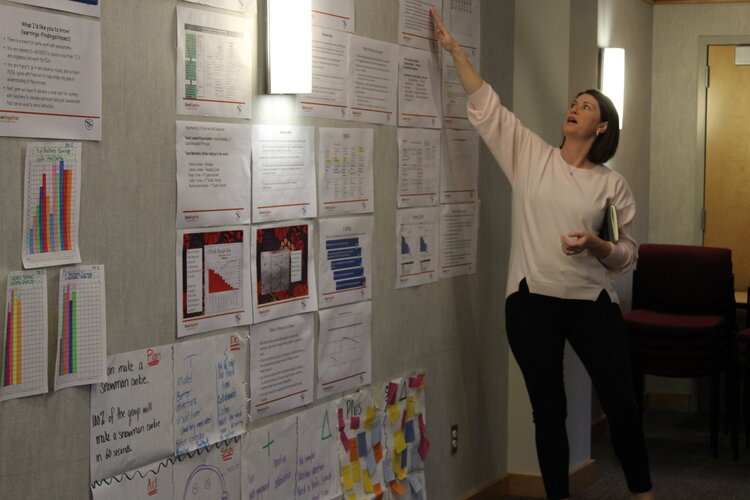Continuous Improvement (CI) Science Spreads Across County
The Spartanburg Academic Movement (SAM) announces the graduation of 23 educators 2019-2020 Continuous Improvement (CI) for Leadership program, offered through SAM’s training hub, the John T. Wardlaw Institute for for Continuous Improvement.
During the Continuous Improvement for School Leadership six-month training, educators spent 25 training hours plus many additional hours in project-specific work tackling issues related to shifting teaching cultures and engagement, effective communication of state learning standards, use of best practices, and teachers’ use of data-informed strategies in classrooms across Spartanburg County. Increasing the rigor of instruction and classroom assessments was a common theme. Participants shared their projects on February 19th, 2020.
Amanda Justice, CI Coach at Jesse Bobo Elementary explains the process used to build effective PDSA cycles in classrooms in two District Six schools.
“We have learned that pre-assessments are a vital component for instructional planning and they can be simple. They provide a target for instruction that can be communicated to students. A big take-away for our school, is that teachers have realized that you teach differently when have a centralized focus,” said Victoria Bradley, CI Coach at Mary H. Wright Elementary.
As part of SAM’s Four Schools Project, launched in 2017, Mary H. Wright is farther along in embedding CI practices in its classrooms than other schools. The leadership level project focused on helping teachers refine their use of CI and PDSA (plan-do-study-act) instructional cycles.
CI Coach and Early Childhood Literacy lead Suzanne McEntire, explains the process being used to build the data-focused culture at Drayton Mills Elementary
Drayton Mills Elementary is working to build the culture and expectations needed for building CI work across the school and hired Suzanne McEntire, as CI Coach for this academic year. McEntire shared how the effort to start building a CI culture at the school took multiple forms.
With kindergarten teachers, McEntire helped teachers identify students’ biggest weaknesses: vocabulary and letter identification for our students. They then identified small group work as the best opportunity for building those skills and took a deep look at how small group instruction was handled, adopting a new strategy, Leveled Literacy Intervention (LLI) for the improvement process. McEntire explained that they spent time building small-group instruction practices with regrouping in response to student growth.
The work also brought to light new resources needed to support instruction which were then purchased and used.
“We need to bring this into our first-grade classes. We need to be sure that we are formalizing a plan that is systematic and intentional and being sure we are spreading that practice throughout the grade levels and offering that support for our teachers,” McEntire said.
In addition to supporting new instructional approaches, McEntire and school principal Thomas Webster worked to set the expectation for the school’s data-driven focus.
“We want to make sure we established a culture of data meetings and making sure that teachers are not taking the data as punitive, but understand that data is the tool for moving instruction and learning forward. It’s not about what they aren’t doing, it’s about where they need to go next,” McEntire explained.
In Spartanburg District Five schools, Continuous Improvement strategies are being used to respond to needs of SPED (special education) students.
Building CI practice into efforts to better serve SPED students was the focus of District Five’s project.
As in Bradley’s project in a District 7 school, the project implemented in two District 5 schools included focused on a specific element of the PDSA (plan-do-study-act) Continuous Improvement teaching cycle.
“We realized that our teachers were not spending as much time in the reflective part of the process before moving forward with new instruction,” explained Angie Showalter, principal of Wellford Academy. Increasing use of the “plus (+) delta (Δ)” charts became the focus of their project. The charting technique captures student feedback for what instructional techniques helped them learn (the “plus”) and which ones did not (the delta, meaning change). Teachers use this feedback in planning the next cycle of instruction to better leverage students’ learning patterns.
Using the CI tool “5 Whys” helped administrators get to the heart of why the plus-delta tool wasn’t being used. The answer became clear: teachers and students had not seen use of the tool modeled enough to build confidence in how to use it. Once that was clarified and additional coaching provided to teachers, plus-delta use went from 11% to 100% in just a few months.
In addition to the use of CI specific tools, the project includes elements that will be monitored through the rest of the school year, including: “By May of 2020 100% of teachers will use data to drive instruction for all students as measured by PDSA cycles.”
“The effort to improve practices and results in our schools is not a “one-and-done” action. It mirrors the continuous improvement cycle in every way. It’s about being intentional about the steps, patient as the learning occurs, and realizing that a failure truly is a fail forward,” explained Mendy Mossbrook, director of the Wardlaw Continuous Improvement Institute.
“If teaching and administrative practices aren’t producing the desired results then the worst thing to do is to keep using them. Finding out what doesn’t work is one step closer to finding out what does. That’s failing forward and that is a success,” she added.
Continuous Improvement work in area schools began as part of “The Four Schools Project,” an effort to improve student achievement in the County’s four highest poverty schools. Since the project launch in the fall of 2017, more than 300 educators have participated single day CI workshops. Two educators leadership groups have completed project-based training.
“These graduates are leading the effort to spread the CI success we’ve seen in The Four Schools Project across the County’s educational system. We are thrilled to see this happening,” said Mossbrook.
Participants in the 2019-2020 CI for School Leadership program include:
School District 2
Michelle Call, Rainbow Lake Middle School
Mandy Ehlich, Boiling Springs Intermediate
Michelle Kimbrell, Boiling Springs Elementary
Martha Waters, Hendrix Elementary
School District 5
Jill Brady, District Administrator
Emily Dean, District CI Coach
Karen McMakin, Abner Creek Elementary
Angie Showalter, Wellford Academy
School District 6
Keith Burton, Lone Oak Elementary
Catherine Pogue, Jesse Bobo Elementary
Amanda Justice, District CI Coach
Allie Thrower, District CI Coach
Cindy Pridgen, District Early Literacy/CI
School District 7
Victoria Bradley, Mary H. Wright Elementary
Marquice Clark, Cleveland Academy of Leadership
Rod Daniels, Carver Middle School
Syreeta Greene, Spartanburg High School
Shirley Hames, Cleveland Academy of Leadership
Tammy Jordan, Mary H. Wright Elementary
Suzanne McEntire, Drayton Mills Elementary
Alanda Posey, Cleveland Academy of Leadership
Thomas Webster, Drayton Mills Elementary
Spartanburg Preparatory School
Tomika Whitmire, Head of School



